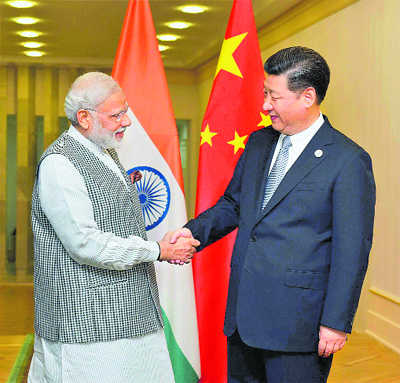
PM Narendra Modi with Chinese President XI Jinping in Tashkent:China was not the only nation that stalled India’s NSG bid. PTI
Simran Sodhi
THANK heavens for Brexit. It helped take some attention off the fiasco in Seoul where India's desperate bid to get into the elite Nuclear Suppliers Group (NSG) suffered a rejection. What makes it even more embarrassing for the government is that this is a twin failure.
First, a rebuff at the diplomatic level, where despite the Foreign Secretary rushing off to Seoul failed to save the mission; and, second, a substantive failure at the political level where the Prime Minister received a royal Chinese snub.
The double rebuff was totally avoidable. India's desire to get into the NSG is understandable but what puzzles an observer is the hype that was created around it. Any oldtimer would have told the Modi establishment; do the smart diplomatic homework before shouting about it from the rooftops. Politically, one wonders who advised Prime Minister Narendra Modi to invest his personal prestige to the extent of himself raising the issue with the Chinese President. A smart diplomat and an astute politician should know that the Prime Minister steps in only to seal a deal, not to make requests. In the case of the NSG fiasco, India messed up at both the fronts and pretty badly.
(Follow The Tribune on Facebook and Twitter @thetribunechd)
It makes no sense to now make a case that it was “one country” that repeatedly raised procedural issues and thwarted India's bid. China, to its credit, was very public in its opposition to India's entry. In the runup to the NSG plenary meeting in Seoul on June 23-24, China repeatedly issued statements that made it amply clear that it was in no mood to let India into the elite nuclear club. India had its work cut out — and that was to talk and convince China. From President Pranab Mukherjee travelling to China last month, to the Foreign Secretary S. Jaishankar making a below-the-radar visit to Beijing just two weeks before the NSG session, India tried convincing China — and failed. The failure to convince China should have made the Foreign Ministry more cautious about going so public about its NSG bid. Again, this failure should have alerted the top bosses in the Foreign Ministry not to advise the Prime Minister to raise the stakes by taking up matter with the Chinese President when they met on the sidelines of the Shanghai Cooperation Organisation (SCO) in Tashkent. To any observer of foreign policy, it remains a puzzling scenario as to who advised Prime Minister Modi to then raise this issue with President Xi Jinping. Did someone really think that China would reverse its decision just because the request was being made by India at the highest level? Surely, no one could have been that naïve not even in this national security establishment. Maybe it was a political decision to hype the NSG berth and for Modi to raise the issue with Xi Jinping himself. After all the headlines would have been awfully good if the Prime Minister’s request had been accepted by the Chinese leader. It makes one wonder who is doing all this fantastical thinking in the Ministry of Foreign Affairs and in the Prime Minister's Office. Is it the Foreign Office which misled the Prime Minister in thinking that India's NSG berth would give him the same kind of historical legacy as the Indo-US civil nuclear deal in 2008 gave former Prime Minister Manmohan Singh? Or was it a political push to the Foreign Office to deliver, to make this desperate bid so that a political historical “event” could be created? Whoever might be at fault, one thing that has emerged crystal clear from the NSG fiasco is that many of the top officials — bureaucrats and politicians — in this government are yet to grasp the brutal realities of geopolitics. If legacies were this easy to create, well, our history books would be way thicker. But both past and current history teaches us one valuable lesson — which was conveniently forgotten this time around — do the groundwork, be sure of the outcomes, before going public with it.
Also, somewhere let us not be parsimonious with facts. China was not alone. Turkey, New Zealand, Brazil and even Switzerland raised their objections in Seoul. Now Switzerland is another blot here. Modi travelled all the way to Switzerland, again made a public spectacle of the Prime Minister requesting the Swiss leadership for support for a berth in the NSG. The Swiss "agreed", a diplomatic feather was added to the Prime Minister's hat and everyone went ga ga over how India and the Prime Minister is winning the world over.
Cut short to Seoul, a few weeks later, and the Swiss don't seem to be supporting India. Again, should we not be asking some tough questions of the people who were leading the charge. China, yes, is uncomfortable with India's rise and wants to always hyphenate us with Pakistan and hence no support. We always knew that, but “pray” what happened to the Swiss? Someone should be doing a lot of explaining here. Even Turkey took a “principled” stand and said that India and Pakistan's applications be considered simultaneously. The world knows about Pakistan's proliferation record and no one needs a re-introduction to A Q Khan, but didn't India realise that “right” arguments do not always convince the other?
We owe it to ourselves to take a hard look at the way we conducted ourselves, diplomatically and politically in this entire NSG saga. We have ended up looking rather inelegant, a little immature and a bit desperate to grab things. And as India moves into the next round of negotiations for NSG or other "clubs", a bit more grace and quiet diplomacy should be the preferred norm.



























